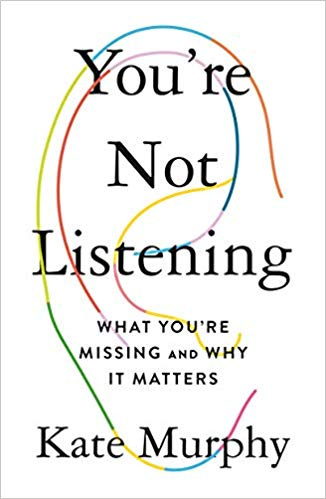I would love for the following words to be encouraging and helpful to you. We are living with constant uncertainty and anxiety about COVID-19. "As America is shutting down" (to quote one reporter), may we be reminded that almighty God himself is NOT shutting down. He is still present with his people. This is a moment for faith in God.
What I write is intended to be helpful or encouraging to you. You will have to be the judge as to whether or not this is happening. Each “Encouragement Note” contains thoughts, quotes, and suggestions. At times, I will simply communicate what I have read or a podcast I heard.
I see myself as ordinary. As I write, I particularly have in mind other ordinary people - perhaps like you. If we were in the same room, the following is what I might share with you today. Many of us are just trying to navigate life in a whirlwind of challenges.
Each issue offers “The List of Five.” Maybe you will find a take-away that is encouraging or helpful. (In case you missed it, you just might enjoy the 2:28 audio clip above.)
The List of Five
Are you focused on where you are lacking or are you focused on the opportunity to live a significant life?
What about you? Some people act as if they are disqualified from living a significant life.
I’m too young
I’m too old
I don’t have enough education
I don’t have an important job with a prestigious title
I don’t make enough money
I’ve made too many mistakes
I’m retired
There are, of course, those who believe they will never live a significant life because they are ordinary. The truth is that God can and will use you - even you.
For years, I spent far too much time and energy focused on where I was lacking. For some reason, I felt like I just wasn’t good enough. I attempted to compensate by constantly trying to prove myself. Always taking another class, earning another academic degree, attending more conferences, etc. The problem is that I was attempting to fill a deep hole that I perceived to be within myself and consequently my ministry. Yet, I avoided dealing with the more profound and unsettling question:
Why do I feel like I am not good enough?
It was very self-defeating. Even today, I still have to stay on top of this. Do you relate to this at all? I suspect many of us do.
A few suggestions:
Pray that God will use you to bless another person today. (Why not consider making a short list of who those people might be?)
Be intentional about looking for even the smallest opportunity to do good. Leave the results to God. You be the one to initiate a smile, a conversation, send an encouraging text, etc. You be the one to do good.
Forget the disqualifications that you impose upon yourself (such as those in the list above). Sometimes these are based on fear and timidity. You are cherished by God and he will use you far beyond what you might imagine.
Start. What is the next right step that you could take?
What Gracious People Do
Gracious.
Now I like this word.
Like you, however, I have been around some people for whom the word “gracious” doesn’t seem to fit.
It was a busy evening. This particular church was attempting to feed a lot of people. Volunteers had been working in the kitchen in their church building throughout the day to prepare for a big crowd that evening. Other volunteers had come the day before after purchasing food at the local Sam’s. Here were lots of people working together. Again, all were volunteers.
One couple came through the line. He complained because his portion was smaller than what he wanted. The person serving apologized and explained that they were trying to give small portions of this particular dish because they wanted to make sure that everyone got some before they ran out. The man was visibly displeased and muttered something about the volunteers needing to do a better job of planning. No thank you. No gratitude.
That is not graciousness.
On the other hand, I have known gracious people. For example, I witnessed one gracious man interact with people many times in social settings. He would never humiliate, embarrass, or in any way communicate displeasure over something like the above example. He spent his time thanking people and expressing gratitude to them for the work they had done. At such dinners, he often wandered through the kitchen complimenting people and thanking each person for their service.
Graciousness is reserved for people who recognize that they are privileged to receive what they have been given. Or as Fred Craddock once said, “The final act of grace is graciousness.”
A few characteristics of a gracious person:
A gracious person is slow to take credit and quick to lavish praise.
A gracious person never seeks to embarrass another. Humiliating another is not in this person’s vocabulary. (Please don’t say something that humiliates another and then try to escape responsibility by saying, “I was only joking.”)
A gracious person is regularly thanking others. Do you go through an entire day without thanking another?
A gracious person doesn’t monopolize the conversation. This person recognizes that others have something to offer.
A gracious person doesn’t try to play one-upmanship. (“That’s nothing, you should have seen what I did!”)
A gracious person pays attention to other people. Sometimes people come away from such conversations saying, “He made me feel like I was the most important person at that moment.”
A gracious person desires to say what is appropriate. There is no redeeming value in emptying one’s mind of whatever fleeting thought has happened to land at the moment.
A gracious person looks out for the comfort of others.
A gracious person looks for the good. Maybe you are visiting a friend who lives in another place. Instead of pointing out the inadequacies of your friend’s community, you are constantly finding things that are good. “This cafe has outstanding peach pie! That was delicious.” “I just love the way you have planted your garden. It is beautiful!”
In so many of us, there is a genuine hunger to experience the beauty of graciousness. After all, this is nothing more than grace lived out. And — that grace originates in the heart of God.
Thinking About . . .
I am thinking about just how busy your life might be. This may be true especially if you have young children who are at home. Baseball, soccer, basketball, football, music lessons, theater practice, etc. On and on it goes. So many families are absolutely exhausted. There is little time to think deeply, feel deeply, or to just be present. As a result, we frantically work to keep up the pace while our souls are malnourished, our bodies tired, and our minds on “auto.”
Look at the next three months of your calendar. Consider the ball games, the concerts involving the kids, the trips on their behalf. Think about the energy it might take to live at this pace. (Of course it is tempting to think that raw energy, adrenaline, and lots of coffee will get us through this.) The following questions might be helpful as you reflect upon the commitments on your calendar:
What is scheduled that will nourish my soul?
What is on my calendar that might restore my body?
Are there habits in place that will refresh my mind?
Do I have in place on my calendar opportunities for rest?
Am I intentional about replenishing my emotions? If I am in a season that is difficult and challenging, am I intentional about scheduling something - even something that seems small, that will be a positive moment for me emotionally?
The Lord is my strength and shield.
I trust him with all my heart.
He helps me, and my heart is filled with joy.
I burst out in songs of thanksgiving.The Lord gives his people strength.
He is a safe fortress for his anointed king. (Psalm 28:7-8)
Learn to Listen
Years ago, Dr. Paul Faulkner talked with our class about the “neglected curriculum.” Basically, these were concepts and skills that people need but are not often taught. One piece of this neglected curriculum was “listening.” He told us that speech in its various forms are discussed and taught at school. However, it was his experience that one rarely learns how to listen. Nor, is listening “taught.” Later as I reflected upon what he said, I realized that I really wasn’t a good listener.

Recently, I read Kate Murphy’s book, You’re Not Listening. (See the excellent quotes below from chapter 12). I enjoyed the book and certainly grew from reading it. I want to be a better listener.
“Open, honest and exploratory questioning and the genuine curiosity and careful listening it presupposes can not only bring about greater clarity of what is on someone else’s mind it is also the very basis of intimacy. The questions can be as simple as “What did you learn today?.” Another good one might be, “What was the best part and what was the worst part of your day.” The more you know about and understand where someone is coming from the closer you feel to them whether they are loved ones or strangers.”
“Good listeners are good questioners. Inquiry reinforces listening and vice versa because you have to listen to ask an appropriate and relevant question. And then as a consequence of posing the question you are invested in listening to the answer. Moreover asking genuinely curious and openhearted questions makes for more meaningful and revelatory conversations not to mention prevents misunderstandings. This in turn makes narratives more interesting, engaging, and even sympathetic which is the basis for forming sincere and secure relationships.”
She goes on to say, “What is love but listening to and wanting to be a part of another’s evolving story. It is true of all relationships, romantic and platonic. Listening to a stranger is possibly one of the kindest, most generous things you can do. People who make an effort to listen and respond in ways that support instead of shift the conversation end up collecting stories, the way other people might collect stamps, shells, or coins. The result is that they tend to have something interesting to contribute to almost any discussion.”
(JM) This is helpful. Good listeners ask questions which help to support and bring out more. A question might ask for clarity. “What was that like?” or “What happened next?” On the other hand, some appear to listen but their comments shift from responding to what the person was saying to actually bringing attention to themselves. “That’s nothing. You should have seen what happened to us when we went on vacation last year.”
God is our refuge and strength,
always ready to help in times of trouble.
So we will not fear when earthquakes come
and the mountains crumble into the sea. (Psalm 46:1-2, NLT)On March 2, we had a new granddaughter, Elsie Maye, born to our daughter Jamie (and our son-in-law, Cal) who live in Oklahoma City. The second day of her life, I held her in the hospital room and quietly prayed for her. Days later, on March 13, my mother, Polly Martin died. She was 95 and lived in the Dallas area. I had been with her just a few days earlier. The last thing I did with her was to hold her hand and pray. I said to her, referring to her future, “Mama, its going to be all right.” She is now with the Lord.
In this birth and in this death, we are thanking God.
Resources
Nir Eyal on putting every single activity he does in his calendar. See also his post “Learn How To Avoid Distraction In A World That Is Full of It.” First heard him on Amantha Imber’s podcast.
You may want to check out Maura Level Thomas’ article “10 Strategies for Managing Stress in the Workplace.” Note also her excellent info graphic in the same article.
“Narcissism makes us less human. Eventually the masks meant to protect ourselves and ease the ache of our longings become the only faces we know” (Chuck Degroat, When Narcissism Comes to Church). See his website here.
I recently become acquainted with Arthur Boers’ book, Living Into Focus. The subtitle is “Choosing what matters in an age of distractions.” (Forward by Eugene Peterson) I particularly appreciate his discussion of the six aspects of how technology affects us. These are: attention, limits, engagement, relationships, time, and space. His discussion in each of these areas is very good - pp. 73-74.
I just spent a few hours re-reading parts of The Mission of God’s People by Christopher J. H. Wright. I read this book a number of years ago and was very impressed. Wright is an Old Testament scholar and an excellent communicator. This book is helpful and very “readable.” If you want to do further reading on the mission of God, you might also enjoy The Gospel of Our King by Bruce Riley Ashford and Heath A. Thomas (published 2019).
Each Friday/Saturday, I post about ten tweets especially for ministers and other church leaders as they anticipate Sunday. You can find me @jimmartin.
Jim Martin serves as Vice President of Harding School of Theology, Memphis, Tennessee. You can find him at God-Hungry.org. His e-mail address is: jmartin9669@gmail.com. Feel free to write.
















Share this post